- Home
- Brandon Sanderson
Starsight Page 13
Starsight Read online
Page 13
“You’re using live fire?” I demanded. “During a testing exercise?”
No reply came from Flight Command. My hands grew tense on my controls, and my heart started racing. Suddenly the context of this entire fight changed.
“Scud,” I said. “What is wrong with these people? They complain about aggression, then send fully armed drones against a bunch of half-trained hopefuls?”
“I think,” M-Bot said, “maybe the Superiority might not be very nice.”
“What led you to that brilliant deduction?” I said, grunting and spinning my ship in a light-lance pivot around an asteroid. Above, three Krell drones swarmed down through the field, targeting me.
Calm, I told myself. You know how to do this. I moved by instinct, boosting a little faster and judging the drones’ attack strategy. Two stayed on my tail while one sped up and cut to the right, trying to get ahead of me.
I didn’t rely on my cytonic senses to read the drones’ instructions—I didn’t want to show off that I knew how to do that—and instead piloted normally. I cut to the side, spearing an asteroid with my light-lance and spinning around it before letting go at just the right moment to send me hurtling back toward the drones. I held my fire though. As we passed each other, I performed another pivot, darting after them.
This put me behind them. Normally, my job would be to chase these two back toward where Kimmalyn would be waiting to pick them off. Today, I’d need to do it all myself. I started firing on the drones, but they split apart, heading different directions. I chose one and dodged after it.
“I’m tracking the other two,” M-Bot said. “They’re weaving back this way, but it’s slow-going through the asteroids.”
I nodded, focused almost entirely on the chase after this drone. It cut downward, and I was able to anticipate it, darting parallel to it. I waited for it to turn again, and at exactly the right moment I launched my light-lance and speared the enemy ship. Quickly, before it could tug me off course, I shot the other end of the light-lance into a nearby asteroid.
The result was that the enemy ship unexpectedly found itself tethered to an asteroid. When it turned, it was yanked off course by the lance, and slammed into the asteroid in a spray of sparks. Hope you were watching that, Cuna, I thought with a grin of satisfaction.
“Well done,” M-Bot said. “Nearest enemy is at your eight. Highlighting on proximity display.”
I followed his suggestion, making a set of maneuvers that took me into a denser section of the asteroid field. Enormous rocks tumbled in space there, shadows playing across them under the floodlights of my ship. M-Bot helpfully changed his proximity screen to a 3-D hologram that showed a hovering scale map of the field, which rotated as I turned.
I managed to get behind one of the other Krell, but the third one—the one that had gone around to the outside direction—fell in behind me. Destructor blasts flashed around me and smashed the stones, spraying chips through the void. Debris popped against my shield.
“Engaging synthetic auditory indicators,” M-Bot said, and the soundlessness of space was replaced by rattling and explosions, reproduced to remind me of an in-atmosphere battle. I took this in—the sight of the asteroids, the feel of the explosions, the cold readouts, and the thundering of my own heart—and I grinned.
This was what life was about.
I spun through the asteroids, giving up the chase, and let both drones get on my tail. Then I led them in a sweeping game. Dodging, light-lancing, staying just ahead of them. Explosions rained around me. It was pure combat. My skill against that of the pilots, flying the drones from the safety of wherever they were holed up.
The explosions from other parts of the battlefield showed me for certain how little the diones and the Krell regarded the lives of anyone they considered beneath them. True, it did seem that most of the time they gave ships a chance to surrender if their shield went down. Many did just this—in fact, many gave up even before losing their shields.
It was difficult to be that precise with live fire, however, and some unfortunate ships took a stray shot just after their shield failed. Those didn’t get a chance to surrender. Others kept fighting, stubbornly, when outnumbered and overwhelmed. They were not shown mercy.
A blast from one of my tails exploded an asteroid just ahead of me, throwing out debris. I grunted and pivoted around a different asteroid to get out of the way. The GravCaps flared as I took the turn, my seat rotating to divert the g-forces backward. The sudden spin still pressed my skin back from my face.
“Careful,” M-Bot said. “I’d rather not get blown up today. I’m just starting to believe I’m alive. It would be unfortunate to suddenly become un-alive.”
“Trying,” I said, grinning through gritted teeth as I launched out of the spin and reoriented myself, with the drones scrambling to follow.
“Do you think maybe I can learn to lie?” M-Bot said. “Really lie? And if I can, do you think that might prove I’m sapient?”
“M-Bot, this is really not the right time for an existential crisis. Please focus.”
“Don’t worry. I’m capable of doing both at once because of my multitasking routines.”
I cut around another asteroid, then another, pushing myself—and even M-Bot’s advanced GravCaps—to their limit. I was rewarded as one of the ships tailing me collided with an asteroid.
“You know, you humans are lucky the Superiority bans advanced AIs,” M-Bot said. “Machine reaction times are vastly faster than your fleshy ones; your inferior biological brain would never be able to stay ahead of them.” He hesitated. “Not that humans are completely inferior to a robot. Um, you do have better taste than I do in…um…glasses.”
“You don’t wear glasses,” I said. “Wait, I don’t wear glasses.”
“I’m trying to figure out how to lie, all right? It’s not as easy as you all pretend it is.”
I turned and popped up into a large clearing among the asteroids, an open spot where collisions weren’t as threatening. Here, many of the more stubborn would-be pilots still scrambled about in a chaotic mess, destructor fire lighting up the placid asteroids.
“One plus one,” M-Bot said, “is two.”
I could imagine the panic of those pilots. I had felt it during some of my first battles. Barely trained, confused by the mess of destruction around me. My instincts fighting my training.
“One plus one,” M-Bot said, “is…errrr…two.”
As promised, the drones ignored anyone who started flashing their emergency lights. But I could imagine the heartbreak of being forced to do so. You lived your whole life in this suffocating society, with no way to have a good fight. Then you were given a single beautiful chance at expression—only to lose it.
“One plus one,” M-Bot said, “is…thr…no, two. I can’t say it. Maybe I can rewrite myself to—”
“No!” I said.
Click, he replied. Clickclickclickclick.
Great. I still had one tail, didn’t I? I scanned the proximity monitor, wondering if I’d managed to lose them in the fighting. Indeed, as I entered the denser part of the asteroid field, no ships followed me.
I’d lost my tail. I wasn’t used to that. Krell would try to isolate single fighters, particularly if they proved to be very skilled. It was part of their instructions to find and destroy enemy cytonics.
Today though, it seemed like they had other orders: seek the easiest prey. As I skimmed through the upper portion of the asteroid field, no other drones came after me. In fact, I noted several turning pointedly away from me. And…well, that was probably a good strategy. There was no reason to waste resources further testing a pilot with obvious skill.
My heart wrenched as I saw a shuttlecraft explode after having its shield brought down. It was given a chance to surrender, but in a panic, its pilot lost control and collided with an asteroid. Poor soul.
/> I scanned the battlefield, then fixated on another ship that had been split off from the main body. This larger fighter had a long front fuselage that looked almost like the barrel of a gun. The craft was slow for a fighter, but was also armed with many destructors. An obvious warship.
Perhaps because of its slowness, it had attracted a large number of Krell. The drones spun around it, firing, wearing down its shield. It was basically done for, but refused to give up. I’d been there. Refusing to admit I was beaten, because being beaten ended the dream…
“I’m back!” M-Bot said. “What did I miss?”
“We’re going in again,” I said, swerving toward the unfortunate fighter. “Hang on.”
“I don’t have any hands,” he said. “Why are we going in? It appears that most enemy ships are ignoring us.”
“I know,” I said.
“This is a timed survival,” M-Bot said. “If we want the best chances at success, we should hang back and not draw attention. So why not do that?”
“Because sometimes, one plus one equals three,” I said, then dove into the fray toward the struggling fighter.
The fighter’s shield went down right as I arrived. The alien fighter should have powered down immediately, but they kept on flying, trying to dodge behind a larger asteroid. Their weapons—a full six destructor turrets—fired at the Krell.
It was strange to see that many turrets on a fighter, but who knew how alien tactics worked? Perhaps they had rudimentary targeting AIs to fire weapons while the living pilot focused only on flying. Rodge had drawn up some whimsical designs along those lines, and the DDF had found them promising.
In any case, the ship was in trouble, so I did what I did best. I drew attention.
I ripped right through the center of the Krell ships and hit my IMP, blasting away both my shield and theirs. A desperate, dangerous move—but the only way to put them on the defensive and level the odds.
I spun my ship on its axis, then shot a spray of destructor fire—more a wild attempt to scatter pursuers than to really hit anything. I had to quickly spin around, because flying backward was a great way to get yourself exploded.
I picked up some tails—but not as many as I’d hoped—and led these around in another sweep, dodging fire while shooting my own destructors. I hit one of the drones, which fortunately sent the others into defensive postures.
“Oh!” M-Bot said. “We’re being heroes.”
“Sometimes I really doubt how fast you claim to be able to think,” I said to him.
“It’s only when you do something that doesn’t make sense,” he said. “I should have expected this. But…aren’t all of these aliens technically part of the Superiority—the people who are trying to destroy us?”
“Depends on the context,” I said. “Right now, those other pilots are on our side: the side of people trying not to die.”
I swerved back in, and fortunately the beleaguered ship took the opportunity I’d offered. Its turrets locked onto the unshielded Krell and blew two of them out of the sky.
Nice shooting, whoever you are, I thought. Hopefully they would see what I was doing as I drove a few more ships off their back. My job wasn’t to rack up kills, but to keep the enemy on the defensive.
A Krell ship exploded just to my right. My strategy would be effective only as long as the Krell didn’t realize they should ignore me and bring down the larger fighter while it was vulnerable. Fortunately, as a third drone exploded, the others buzzed away. This battle really was different from the ones I’d engaged in over Detritus—these drones weren’t at all interested in destroying the skillful ships.
I fell in beside my new friend, and relaxed a little as a fresh shield ignited around them. I did likewise, bringing my defenses back up.
“We have a call from an unfamiliar channel,” M-Bot said. “I assume it’s the ship we saved. Shall I patch it through?”
“Yes indeed.”
The channel opened to…cheering? Dozens of voices celebrating. But I’d only saved one ship, presumably with a single pilot.
“Brave warriors,” said a deep masculine voice, “we are in your debt. This day, you have saved the kitsen flagship from annihilation.”
“Flagship?” I asked. Then understanding hit me. That ship isn’t much larger than M-Bot, but if the pilots are very small…
“It’s you!” I said. “The king of the fox-gerbils!”
“I do not know what a fox-gerbil is,” the voice said. “But…you must mistake me, of course. I am Hesho—and I am no king, since our planet has an equitable representative government. However, as the humble poet and captain of the starship Gaualako-An, I thank you from the deepest well of my heart.”
I hit the mute button. “M-Bot, I think these must be the samurai fox-gerbils I saw earlier.”
“You mean the kitsen?” he said. “They’re a Superiority race with secondary citizenship. Oh! You’ll find this amusing. I just translated the name of their ship. In their language, it roughly means, ‘Big Enough to Kill You.’ ”
“A ship the size of a fighter must be like a destroyer to them,” I said. “We didn’t just rescue a single pilot; we rescued an entire crew.” I flipped off the mute button. “Captain Hesho, my name is Alanik—and I’m glad to meet you. How would you feel about working together? There’s too much chaos going on in this battle. We need to form an organized resistance.”
“An excellent idea,” Hesho said. “Like a steady rain that becomes a storm, the Big Enough is at your disposal.”
“Great. Keep your guns trained to fire on any drones that draw close. If we get into trouble, I’ll try to distract them from you so you can play target practice.”
“If I might make a suggestion,” Hesho replied. “We should rescue another faster ship, like yours, as it would help balance out our fledgling team.”
“Sounds great,” I said, scanning the battlefield, looking for faster ships we could try to recruit. One immediately jumped out at me—the black ship that held Brade, the human. It swerved through the melee, expertly pivoting around an asteroid. She was good. Very good.
“You see that black ship at my mark 238.25?” I said to Hesho. “I’ll go try to help them out and see if they will join us. You hold steady and call me if any drones target you.”
“Excellent,” Hesho said.
I boosted after the black ship, darting through the chaotic fracas of light and explosions. The ship had two Krell tailing it. I radioed Brade, and the comm light lit up, indicating she was listening.
“I’ll get those tails,” I said. “Just give me—”
The black ship suddenly launched a light-lance into a passing friendly ship. I was shocked, both to see a light-lance being used from a Krell ship, and to see how it used the momentum of pivoting around a friendly ship. The callous move sent the poor unsuspecting ship spinning to the side—where it bounced against an asteroid. The move let Brade perform an expert turn, however, and she dove back through the center of the drones, blasting them both into space dust. She then buzzed past my ship, missing me by centimeters.
I cursed, spinning on my axis, then boosting to try going after her. That had been an incredible move. She had serious flying experience.
“Hey!” I called. “We’re forming up a flight. We could use your…”
The black ship tore away to the right, vanishing farther into the battle, ignoring me completely. I sighed.
“Spensa,” M-Bot said, “I think maybe she doesn’t want to join our team.”
“What made you think that?”
“I’m very observant,” M-Bot said. “However, I believe someone else could use your help. I’m reading distress calls on a general outgoing line. Here, I’m highlighting the source on your proximity monitor and patching it through.”
At once a panicked voice piped through my radio, and my pin
translated for me. “My boosters aren’t responding! Help!”
“Send Hesho those coordinates,” I said to M-Bot, spinning on my axis and boosting the other way to slow down. Then I darted toward the distress call—which turned out to be the shuttle that Brade had used as a counterweight.
After colliding with the asteroid, the shuttle had bounced free and now tumbled through space with one of its boosters flashing on and off randomly. It would spurt in one direction, and then the booster would cut out. It would try to turn, but the booster would cut back on erratically, sending the ship tumbling in a different direction.
Three Krell, eager to prey on the weak, were coming in from different directions. “Hang on,” I told the pilot as Hesho’s ship—thankfully—arrived and began gunning at the various nearby Krell.
“Calculating…,” M-Bot said, highlighting a section of my canopy. “Here is a projected flight path of the damaged ship.”
“Thanks,” I said. “I thought that booster was blasting it around randomly.”
“Few things are truly random,” M-Bot said.
I used the projection to intercept the malfunctioning ship and spear it with my light-lance. I boosted to the left, narrowly towing it out of the path of Krell destructor fire. Unfortunately, the ship’s broken booster immediately ignited, yanking me back to the right.
“I’m sorry!” the pilot’s voice said. I saw a glimpse of them through the front of their ship—it was the single dione in the fight, the one with a two-tone face.
“Maybe you should just power down,” I said with a grunt, trying to regain control. “Turn on your emergency lights and drop out of the fight.”
“I can’t,” the voice said.
“There’s no shame in it,” I said. “You’re not a coward.”
“No,” the voice said. “I mean…the collision seems to have crushed my emergency lights.”
Scud. Maybe the pilots of the remote drones would see that this pilot was obviously in trouble, and leave them alone? No…if anything, there were more drones approaching than I would have expected. Almost as if they wanted to punish this dione who had been so brash as to participate in an activity that should have been reserved for inferiors.

 Steelheart
Steelheart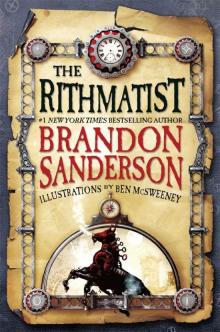 The Rithmatist
The Rithmatist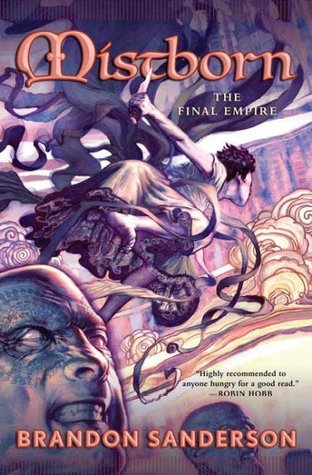 Mistborn: The Final Empire
Mistborn: The Final Empire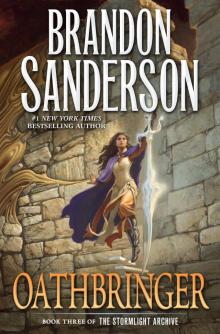 Oathbringer
Oathbringer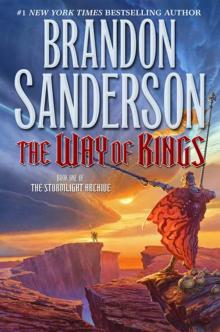 The Way of Kings
The Way of Kings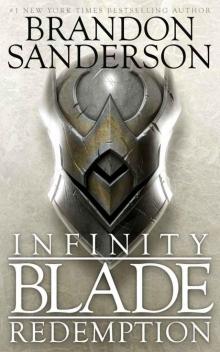 Redemption
Redemption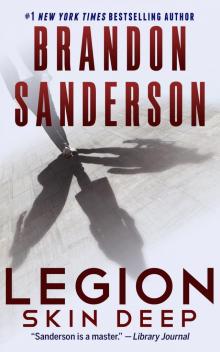 Skin Deep
Skin Deep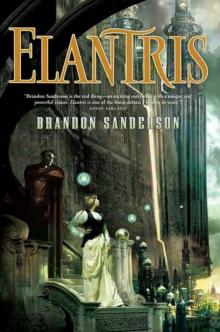 Elantris
Elantris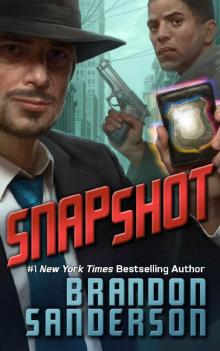 Snapshot
Snapshot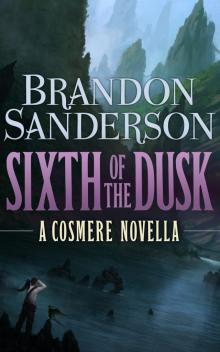 Sixth of the Dusk (Cosmere)
Sixth of the Dusk (Cosmere)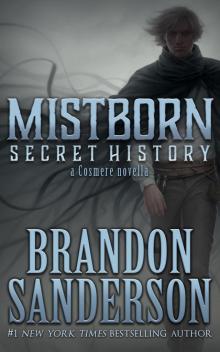 Mistborn: Secret History
Mistborn: Secret History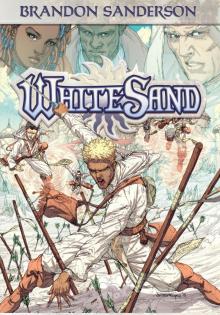 White Sand, Volume 1
White Sand, Volume 1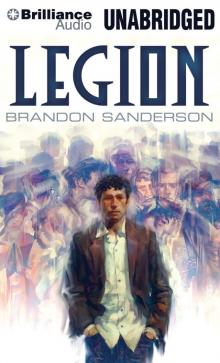 Legion
Legion The Well of Ascension
The Well of Ascension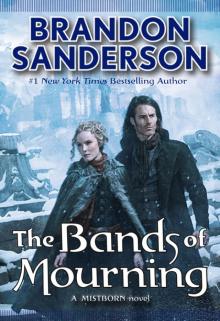 The Bands of Mourning
The Bands of Mourning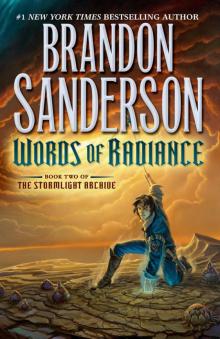 Words of Radiance
Words of Radiance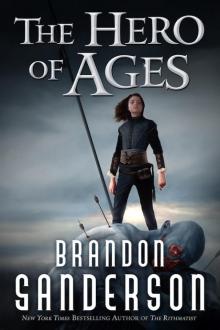 The Hero of Ages
The Hero of Ages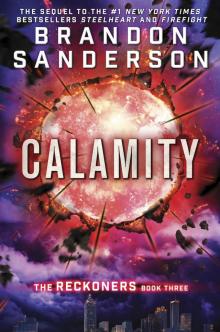 Calamity
Calamity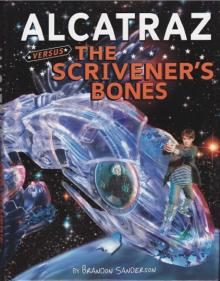 Alcatraz Versus the Scrivener's Bones
Alcatraz Versus the Scrivener's Bones The Alloy of Law
The Alloy of Law The Emperors Soul
The Emperors Soul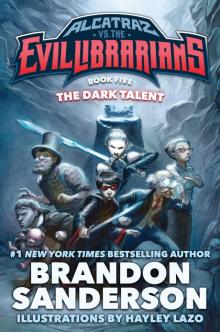 The Dark Talent
The Dark Talent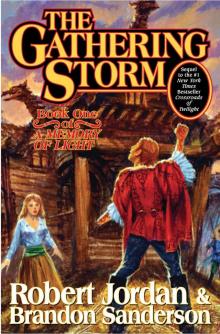 The Gathering Storm
The Gathering Storm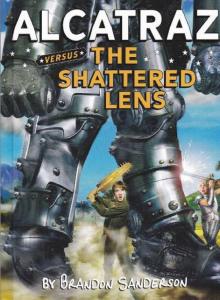 Alcatraz Versus the Shattered Lens
Alcatraz Versus the Shattered Lens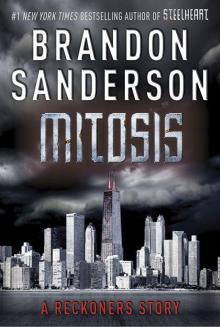 Mitosis
Mitosis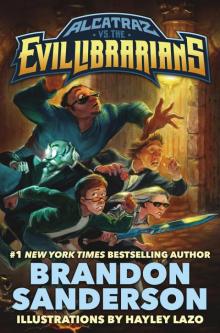 Alcatraz vs. The Evil Librarians
Alcatraz vs. The Evil Librarians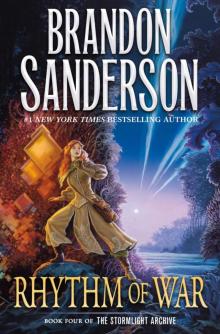 Rhythm of War (9781429952040)
Rhythm of War (9781429952040)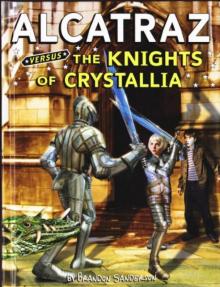 Alcatraz Versus the Knights of Crystallia
Alcatraz Versus the Knights of Crystallia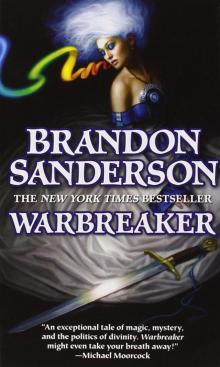 Warbreaker
Warbreaker Firstborn
Firstborn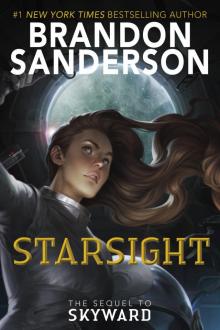 Starsight
Starsight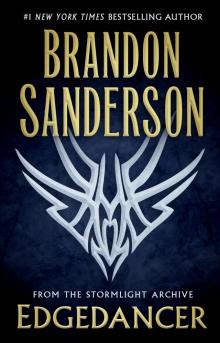 Edgedancer
Edgedancer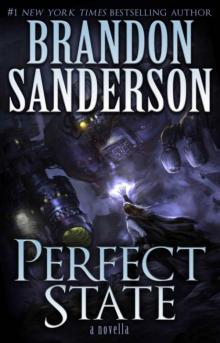 Perfect State
Perfect State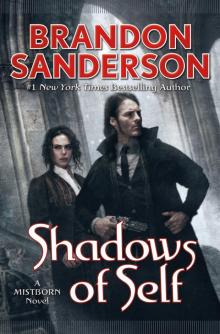 Shadows of Self
Shadows of Self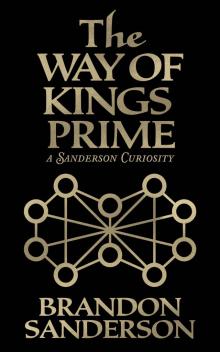 The Way of Kings Prime
The Way of Kings Prime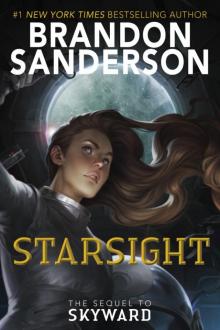 Starsight (US)
Starsight (US)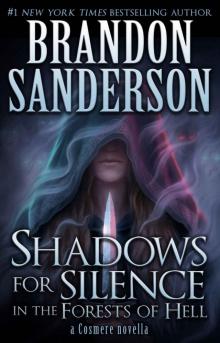 Shadows for Silence in the Forests of Hell
Shadows for Silence in the Forests of Hell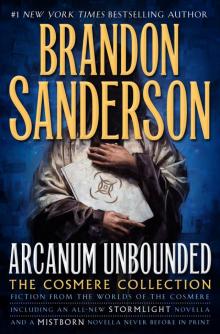 Arcanum Unbounded: The Cosmere Collection
Arcanum Unbounded: The Cosmere Collection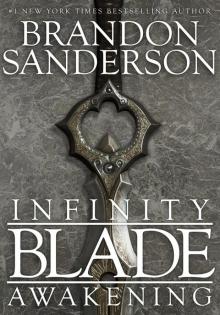 Awakening
Awakening Firefight
Firefight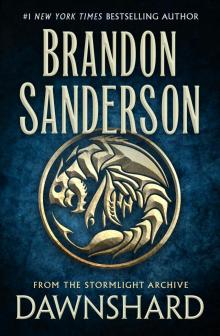 Dawnshard
Dawnshard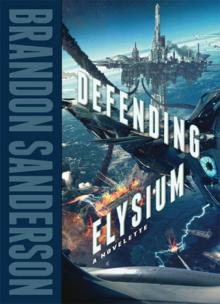 Defending Elysium
Defending Elysium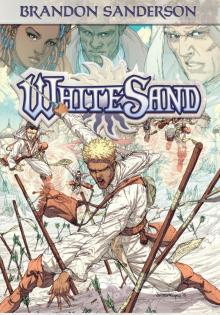 White Sand
White Sand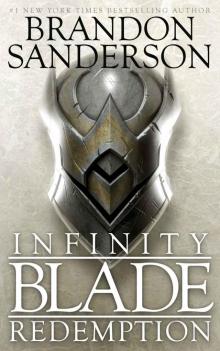 Infinity Blade: Redemption
Infinity Blade: Redemption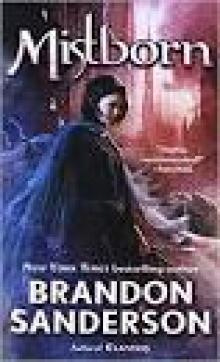 The Final Empire
The Final Empire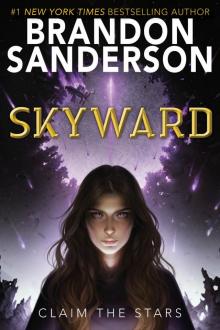 Skyward
Skyward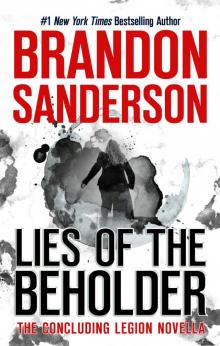 Lies of the Beholder
Lies of the Beholder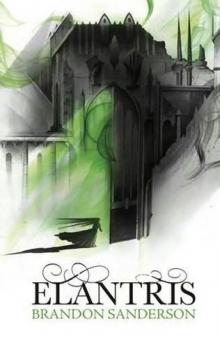 Elantris e-1
Elantris e-1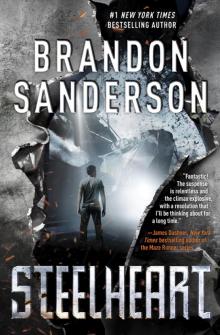 Steelheart r-1
Steelheart r-1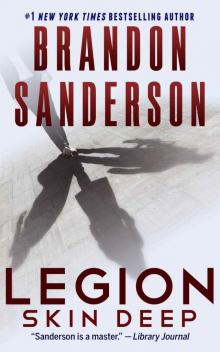 Legion: Skin Deep
Legion: Skin Deep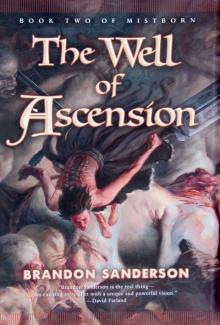 Well of Ascension
Well of Ascension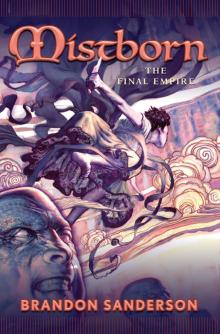 Mistborn
Mistborn Alcatraz versus the Evil Librarians
Alcatraz versus the Evil Librarians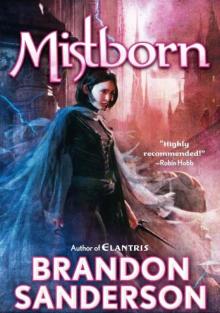 The Final Empire m-1
The Final Empire m-1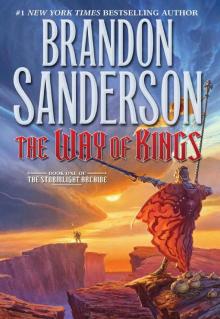 The Way of Kings (Stormlight Archive, The)
The Way of Kings (Stormlight Archive, The)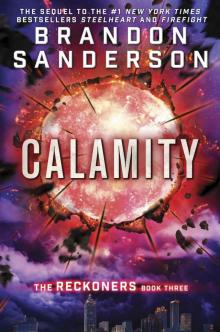 Calamity (The Reckoners)
Calamity (The Reckoners)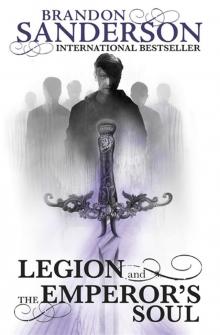 Legion and the Emperor's Soul
Legion and the Emperor's Soul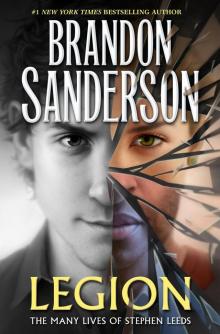 Legion: The Many Lives of Stephen Leeds
Legion: The Many Lives of Stephen Leeds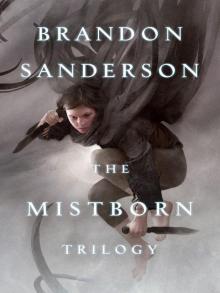 The Mistborn Trilogy
The Mistborn Trilogy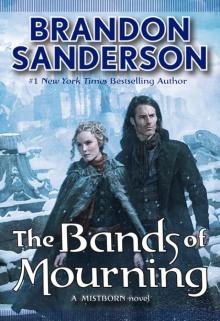 Bands of Mourning
Bands of Mourning Alcatraz
Alcatraz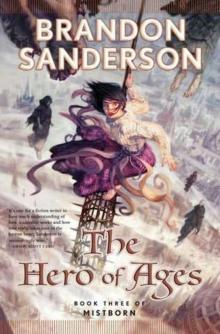 The Hero of Ages m-3
The Hero of Ages m-3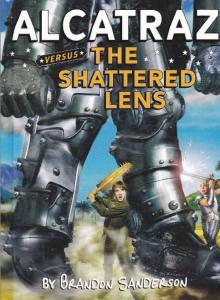 Alcatraz vs. the Shattered Lens
Alcatraz vs. the Shattered Lens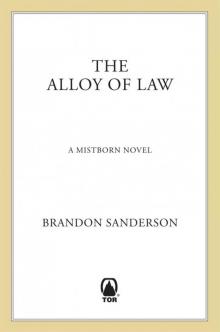 The Alloy of Law: A Mistborn Novel
The Alloy of Law: A Mistborn Novel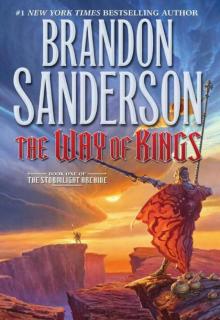 The Way of Kings sa-1
The Way of Kings sa-1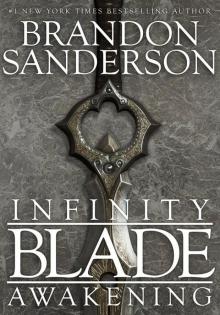 Infinity Blade: Awakening
Infinity Blade: Awakening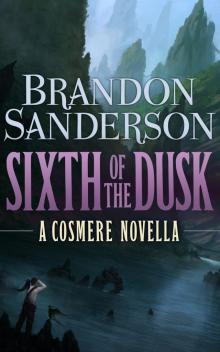 Sixth of the Dusk
Sixth of the Dusk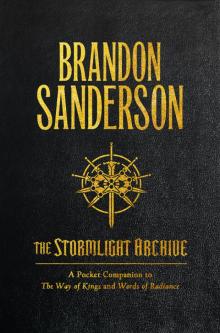 The Stormlight Archive
The Stormlight Archive The Aether of Night
The Aether of Night